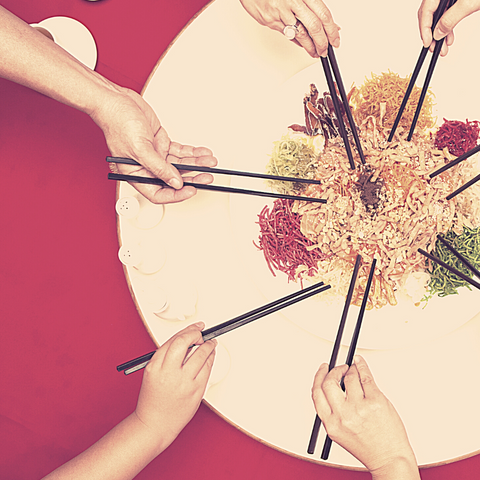The mid Autumn festival is a traditional Chinese moon festival that celebrates the moon that falls on the 8th month of the Lunar calendar, on the 15th day. It is a time to eat mooncake, spend quality time with family, and thank the moon for a full bountiful harvest of the last months.
Mid Autumn Festival
中秋節 directly translates Middle-Autumn-Festival, hence the name Mid Autumn Festival.
Also known as the Mooncake Festival, Lantern Festival, Mid Autumn Festival is the second biggest holiday in China (after Chinese Lunar New Year) and dates back to the Zhou Dynasty 1046-771 BC, where it is first seen in the Rites of Zhou, a written collection of rituals.
So it's been around for 3000 years, but today, this holiday is mostly a celebrated particularly for mooncakes -- notably the most important food of the Mid Autumn Festival. Here's a cool video of a plant-based mooncake making video
There is a beautiful Chinese legend behind the Mid Autumn festival, which actually celebrates Chang'E who is the Moon Goddess of immortality, and it is said this festival is that honors her once a year.
When is Mid Autumn Festival?
Falling on the 8th month of the Lunar Calendar, this full-moon symbolizes the moon is at its brightest and fullest size, which coincides with harvest time in the middle of Autumn. it is always on August 15 of the Moon Calendar.
Because the lunar calendar changes every year, you can expect the Mid Autumn Festival on these days in the coming years:
- 2020 — Thursday October 1
- 2021 — Tuesday September 21
- 2022 — Saturday September 10
Legend has it..
In the ancient times, a Chinese hero named Hou Yi was asked to protect the local village against a violent natural disaster. One of the immortal spirits gifted Hou Yi with an elixir of immortality for his efforts. Hou Yi didn't want to leave his wife, Chang'E, so he asked her to protect the elixir.
One night, when Hou Yi left to go hunting, his brother Peng Meng, went to his home to steal the elixir. He tried to break into their home in the middle of the night but found Chang'e at home protecting the elixir. Peng Meng forced her to give the elixir to him and Chang'e refused to do so. Afraid of the elixir getting into the wrong hands, she swallowed it and immediately flew into the sky. It is said she chose the moon for her residence.
When Hou Yi returned, he was deeply saddened by this news. He started to offer fruits and cakes to the heavenly ancestors in an effort to bring her back. Many in his village learned about his story and joined him in giving these sacrifices to the heavens to help Hou Yi reunite with Chang'e again. This is said to be the origin of Lunar worship, or the moon festival.
3 ways to Celebrate Mid Autumn Festival with family, friends, and food
The mid Autumn festival is a special time to meet family, eat round foods, and admire the moon in her fullest bloom. Growing up, mooncake festival time meant eating mooncakes - an exciting surprise in edible form. It is tradition I always looked forward to during mid Autumn Festival.

Amongst Chinese families, gifting mooncakes between friends and close relatives is pretty common around this time, which is why this holiday is also sometimes referred to as the Moon Festival.
-
Eat mooncake: if you only do one thing during mid Autumn festival, it's that you must eat mooncake.
Not to be confused with a "space-cake", mooncakes are made with a wheat flour pastry containing a sweet paste made of adzuki bean, lotus seeds, fruits, and/or egg. The ingredients used to make this contains TCM herbal ingredients which include oleic acid, linoleic acid, minerals, zinc, iron, potassium, vitamin E and other ingredients which help soften blood vessels to supply the body with Qi after eating. (TCM is everywhere!)

2. Glutinous rice cakes: this is a staple to many Chinese families.
For thousands of years, the broad masses of people have forced a profound friendship with it, and the stickiness indicates harmony and unity of the whole family. And since you're going to be with family during this Moon Festival, it's important to keep this on the menu too!

3. Stop and smell the Osthmanthus: this is a time when its in full bloom, and many who live in Shanghai will pick the flowers to make glutinous rice and osthmanthus stuffed sweet wine. Not just for for floral wine, but this is also wonderful in tea or cook this as a fragrant ingredient added to any dish.



